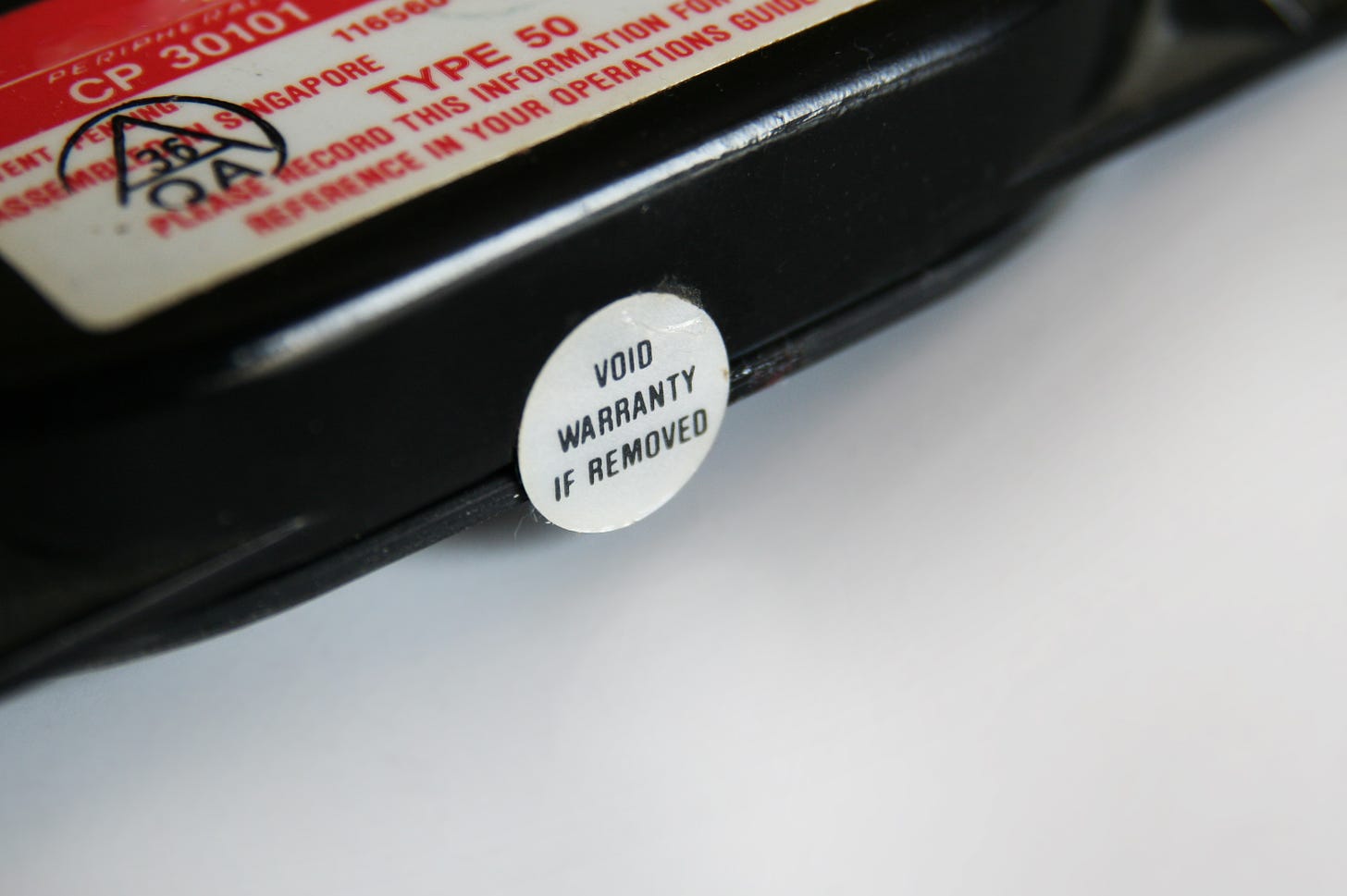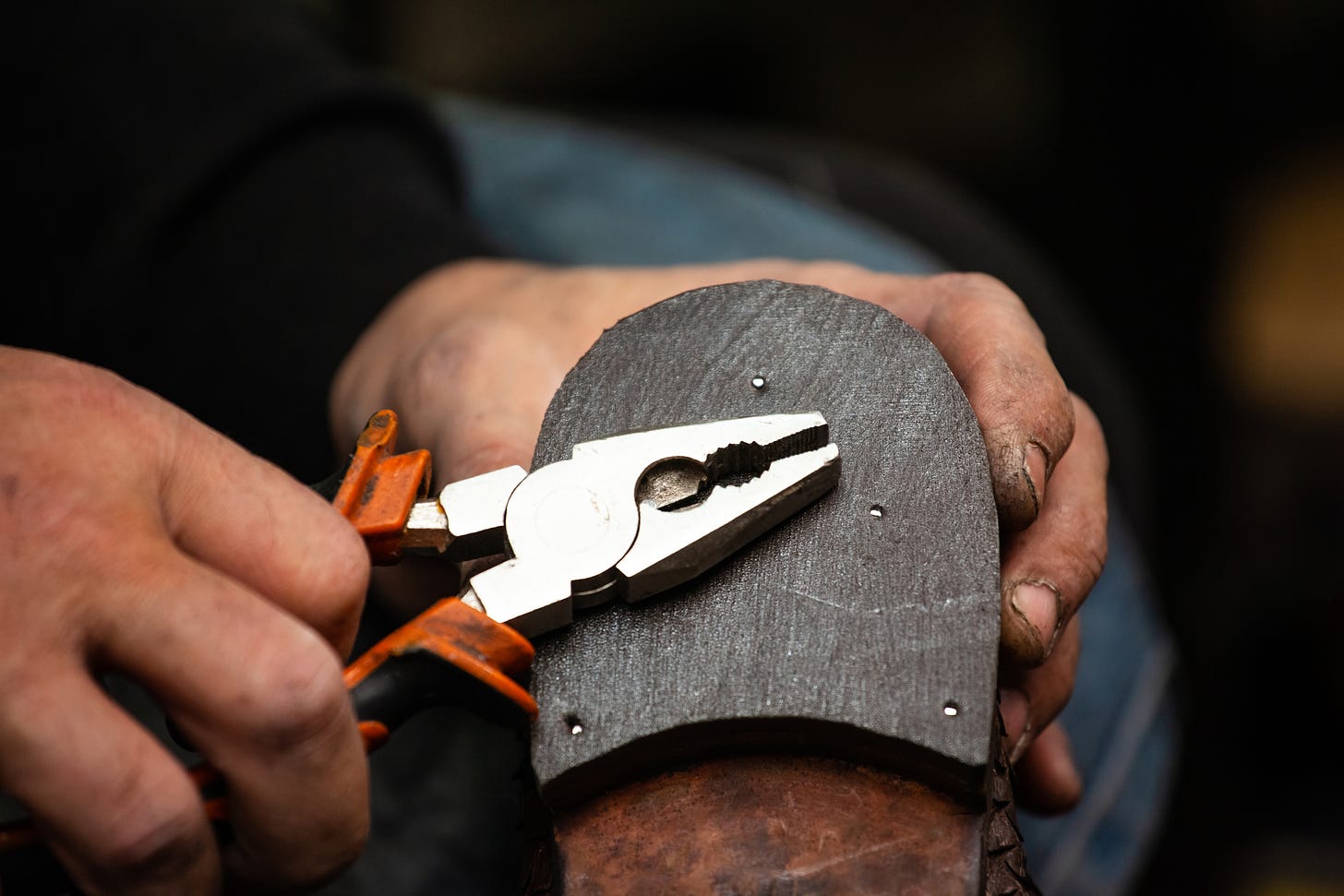FTC Warns Gaming Device Makers over "Warranty Void If Removed" Stickers
The FTC warned 8 companies that language about voiding warranties violated Federal law. Also: One year in, report finds so-so compliance with NY right to repair law.
The Federal Trade Commission has sent letters to eight companies, including leading makers of PC gaming rigs, warning them that their warranty language is a violation of the federal Magnuson-Moss Warranty Act (MMWA).
In a statement July 3rd, the Federal Trade Commission staff said statements that customers were required use authorized service providers or manufacturer supplied parts or risk voiding their warranty “may be standing in the way of consumers’ right to repair products they have purchased.”
Contents:
Report finds so-so compliance with New York state repair law
NIKON publishes repair manual for new $1,600 camera
Do we need a right to repair clothing?
↓Premium content
Apple declares iPhone X, original Airpods "vintage"
Two decades of tech innovation hasn't solved the repairability problem
German state of Thuringia reports strong applications for repair bonus
2024: a pretty good year for the right to repair“These warning letters put companies on notice that restricting consumers’ right to repair violates the law,” said Samuel Levine, Director of the FTC’s Bureau of Consumer Protection in a published statement on the FTC website. “The Commission will continue our efforts to protect consumers’ right to repair and independent dealers’ right to compete.”
Requiring consumers to use specified parts or service providers to keep their warranties intact is prohibited under the MMWA, unless warrantors provide the parts or services for free or receive a waiver from the FTC. The agency also warned that such statements may be considered deceptive business practices under the FTC Act.
The eight companies cited in the letter are aeris Health, Blueair, Medify Air, and Oransi, which manufacture air purifiers and treadmill company InMovement.
Letters issued to gaming hardware makers ASRock, Zotac, and Gigabyte, which market and sell gaming PCs, graphics chips, motherboards, and other accessories, specifically warned about the use of stickers stating that warranties are “void if removed.”
“Consumers should be able to repair the things they own, and manufacturers should follow federal warranty laws. A warranty is a federally protected right, not a privilege that a manufacturer can dangle to convince product owners to use the manufacturers’ repair services. - Nathan Proctor, US PIRG.
In recent years the FTC has increased its scrutiny of companies warranty-related practices and re-exerted its authority to enforce laws like MMWA and other federal laws. It issued similar warnings to six companies in 2018 regarding MMWA violations. A study by PIRG of 50 home appliance makers that same year found that “the overwhelming majority (45) would void warranties due to independent or self-repair.” Then, in 2022, the Commission issued orders requiring motorcycle maker Harley Davidson and grill maker Weber to take multiple steps to correct violations of the MMWA including to cease telling consumers that their warranties will be void if they use third-party services or parts, or that they should only use branded parts or authorized service providers. The FTC said it would seek civil penalties of up to $46,517 per violation in federal court.
The agency has also appealed to the public and businesses for stories of manufacturers’ forcing consumers to use authorized repair providers and threatening to void warranties for those that don’t. The Commission has set up a special link for warranty or repair stories and said it wants to hear about consumer experiences across a wide range of products – from cars, kitchen appliances, and cell phones to grills and generators.
More News
Report finds so-so compliance with New York repair law
It’s been a year since the nation’s first ever electronics right to repair law went into effect in New York State. So how are manufacturers doing when it comes to complying with the requirements of the law? So-so, according to a new report by the PIRG Education Fund. The report, Leaders and Laggards in New York, surveyed 21 different products covered by the New York law, from 17 different manufacturers and rated them on a scale of 0 to 20 for compliance with the state’s Right to Repair Law, which was signed by Governor Kathy Hochul in December, 2022 and took effect July 1st, 2023, covering a wide range of electronic goods sold in the state after that date.
PIRG assessed manufacturers success in providing access to repair manuals and replacement parts in compliance with the state law. The average score across the 21 products was 11 out of 20 - a C+. Products receiving a perfect score of “20” include Apple’s iPhone 15, Microsoft’s Surface Laptop Studio 2 and Steam OLED Steam Deck. A number of vendors received grades of “F” including Sony’s Playstation 5 Slim and Meta’s Meta Quest 3 VR headset. There was one “0 out of 20” score for Apple’s Vision Pro VR headset.
PIRG called on companies that are still not providing access to repair materials to “start doing so immediately.” The New York Attorney General should likewise work to ensure that manufacturers which provide no support for their covered products know about the requirements of this new law, and the prospect of facing financial penalties for noncompliance. Read the full report here.
Nikon publishes repair manual for new, $1,600 camera
Nikon made news in May when it launched a self-service repair program and unveiled a web page devoted to repairing its cameras. The site was sparsely populated at the time, with just a few manuals. But it seems that Nikon is serious about its new DIY repair effort: posting a repair manual for its new Nikon Z6 III camera just weeks after the device was unveiled. Nikon has also increased the number of repair manuals available on the web site to include other current camera bodies.
Do we need a right to repair clothing?
The contemporaneous popularity of fashion resale — with growth in the secondhand apparel market reportedly outpacing that of the overall apparel market by 300 percent — and no-buy challenges, in which shoppers commit to making only necessary purchases for a specified period of time, are further evidence of consumer engagement with waste reduction. According to the Environmental Protection Agency, "[t]he main source of textiles in municipal solid waste (MSW) is discarded clothing."
On cue, EU legislators have cracked the whip: last March, members of Parliament at the European Union voted 514 to 20 to require the implementation of extended producer responsibility (EPR) schemes, targeting textile and food waste. European member states have 18 months from the date the directive enters into force to establish their EPR schemes and enforce the collection of used textiles — including clothing, blankets, bed linens, carpets and footwear — by January 1, 2025.
Apple declares iPhone X, original Airpods ‘Vintage,’ heading to ‘Obsolete’
Apple has officially classified the iPhone X, first-generation HomePod, and original AirPods as "vintage" products, FastCompany reports. The “vintage” designation means the devices were discontinued “more than five but less than seven years ago.” It signals declining support. Specifically: Apple Stores and Apple Authorized Service Providers will still provide repairs for these devices, but only as long as parts remain available. The iPhone X was introduced in 2017 and notable for being the first iPhone with an all-screen design and gesture-based navigation, eliminating the Home button. The first-generation AirPods, launched in 2016, marked Apple's entry into the wireless earbuds market and set a new standard for the industry.
Currently, there are no laws or regulations governing manufacturers’ decisions regarding product reclassifications such as “vintage,” “obsolete” or “end of life.” That has led to head-scratching moments - as with recent announcements by Oral B and Spotify - in which products that have only been on the market for months are declared “end of life” and, in some cases, disabled when critical cloud based systems that support the devices are shut off.
Two decades of tech innovation hasn’t solved the repairability problem
We like to focus on all the amazing capabilities of new technology and the way that tech innovations facilitate our lives. But there’s a really interesting blog post over at xda-developers.com that looks at eight things technological innovation over the past two decades _haven’t_ affected. Number two on that list: repairability.
Electronics were difficult to repair back in the 2000’s “when we first got hooked on computers, phones, and other tech devices,” writes author Tanveer Singh. Two decades later? They’re still hard to fix. “Today, users are much more aware of their rights. But that hasn't changed things much when it comes to device repairability. Even today, outside of a few niche brands, you can't expect a lot of repairability or modularity for your phone or laptop,” he notes. And, when repairs are available they are often priced in ways that make them financially unattractive compared to replacing the broken device.
Other problems we haven’t solved: the “Tower of Babel” that is non-standard cabling (though that is improving with the EU’s standardization on USB-C), software crashes and device overheating. Check out the full article here.
Grants for repair in Thuringia, Germany are “well filled”
EU countries and local governments have been among the most innovative in promoting repair, reuse and other “circular” policies. Case in point: the German state of Thuringia, which offers a state-sponsored "Repair Bonus" program that is designed to subsidize repairs for household appliances to reduce electronic waste. As Right to Repair Europe noted in 2023, repair bonuses were first piloted in the city of Graz in Austria in 2017, with citizens of that city entitled to refunds up to 50% of the total cost of a repair, up to a maximum of €100. That program later expanded to three Austrian federal states: Styria, Upper Austria and Lower Austria and similar programs were later adopted by the cities of Salzburg and a similar voucher-based program in Vienna. The results have been astouding with reports of 90% of the claimed items being successfully repaired in Vienna saving 540 tons of CO2 and supporting 83 local businesses. The voucher based program was later adopted as an Austrian-wide scheme dubbed “Reparaturbonus“ in April 2022. The German program has a funding pool of €500,000. Thus far, only 100,000 euros have been utilized so far to serve about 2,700 applications, averaging about 40 per day. Environment Minister Bernhard Stengele praised the program's success, highlighting that it has helped prevent nearly 400 tonnes of electronic waste since 2021.
2024: a pretty good year (so far) for the right to repair
After years of treading water with scores of right to repair bills introduced in state legislatures, only to die in committee, 2024 looks to continue the “break through” seen in recent years. With over 20 right to repair and extended producer responsibility (EPR) bills introduced in state legislatures this year, 3 have passed and 8 remain active, while 11 have failed, e-scrap news reports.
The passed bills include robust state electronics repair legislation in Oregon in Colorado covering electronics, business computing (Colorado) and home appliances with specific bans on parts pairing. Colorado also passed a resolution calling for FTC repairability scores. Active right-to-repair bills are being considered in Arizona, Maine, Massachusetts, Michigan, New Jersey, Ohio, and Pennsylvania. Additionally, Congress is considering bills governing electronics repair and a right to repair automobiles.
Extended producer responsibility legislation passed in three states: Illinois, Vermont and Wisconsin, e-scrap reported.





